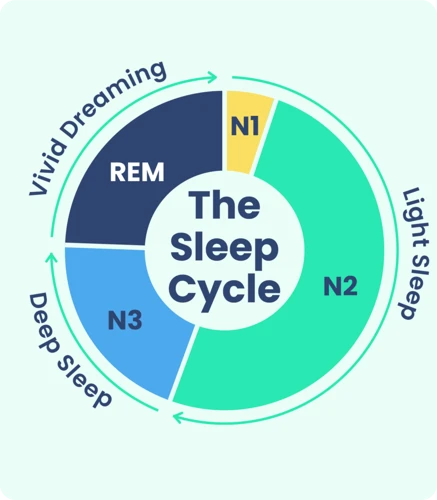Have you ever woken up from a dream feeling disjointed, confused, and emotionally unstable? Perhaps you’ve even found yourself unable to recall anything at all. As perplexing as these experiences may be, they may be more commonplace than you think. The impact of an inconsistent sleep schedule on dreaming is a topic that has intrigued researchers and individuals alike for many years. Sleep and dreams are intertwined in ways that scientists are only beginning to unravel. To better understand how variation in your sleep schedule can affect your dream life, let’s dive into the science of dreaming.
The Science of Dreaming

Dreaming is a phenomenon that has captivated human curiosity for centuries. The idea that we can experience vivid and often bizarre scenarios while we sleep has fascinated people throughout history. However, the science of dreaming is not well understood and remains a mystery to this day. What happens to our brain when we dream? How do dreams occur? These are just some of the questions that scientists have been trying to answer for years. In this section, we will explore the stages of sleep and the importance of REM sleep in the science of dreaming.
Stages of Sleep
During sleep, our body goes through different stages, each of which serves a specific purpose in maintaining our overall health and well-being. There are 5 main stages of sleep, which are as follows:
- Stage 1: This is the lightest stage of sleep that usually lasts 5-10 minutes. During this stage, we may experience muscle twitches and slowed breathing.
- Stage 2: This is a deeper stage of sleep that typically lasts 20-30 minutes. During this stage, our breathing and heart rate slows down, and our body temperature decreases.
- Stage 3: This is the deepest stage of non-REM sleep, also referred to as slow wave sleep. This stage is crucial for physical restoration, and it typically lasts 20-40 minutes. During this stage, it can be difficult to wake up.
- Stage 4: This stage is also known as REM sleep, and it is when most of our dreams occur. During REM sleep, our brain becomes more active, our eyes move rapidly, and our muscles become paralyzed to prevent us from acting out our dreams.
- Stage 5: This stage is also referred to as REM sleep, and it is when most of our dreams occur. During REM sleep, our brain becomes more active, our eyes move rapidly, and our muscles become paralyzed to prevent us from acting out our dreams.
Each stage of sleep is important for different reasons, and disruption of any of these stages can have negative effects on our health and well-being. It is important to understand the stages of sleep and take steps to ensure that we get the quality sleep we need.
Importance of REM Sleep
REM (Rapid Eye Movement) sleep is a crucial stage of the sleep cycle that plays a significant role in many aspects of our health and well-being. During REM sleep, our brain becomes highly active, and this is the stage when we experience most of our dreams. The importance of REM sleep cannot be overstated, and here are some reasons why:
- Memory consolidation: REM sleep is essential for consolidating memories and helps us retain what we learned during the day. During this stage, the brain processes the events of the day and stores them in the long-term memories.
- Emotional regulation: REM sleep helps regulate our emotions and mood. It provides an opportunity for the brain to process any emotional experiences, which can result in a better emotional well-being.
- Physical restoration: REM sleep is also critical for physical restoration. During this stage, the body repairs and rejuvenates itself, which makes us feel more rested and energized the next day.
- Creativity: Studies have shown that REM sleep helps stimulate the brain’s creative centers, leading to increased creativity and problem-solving abilities.
- Hormone regulation: REM sleep plays a role in regulating hormones related to appetite, metabolism, and stress. A lack of REM sleep can lead to imbalances in these hormones, resulting in health problems.
It is important to prioritize REM sleep and ensure that we are getting enough quality sleep to promote optimal health and well-being. An inconsistent sleep schedule can disrupt the normal sleep cycle and lead to a reduction in REM sleep, which can have many negative impacts on our physical and mental health.
The Connection Between Sleep Schedule and Dreaming

Have you ever noticed that your dreams seem more vivid or bizarre on some nights, while on others they are vague and forgettable? It turns out that the consistency of your sleep schedule plays a significant role in the quality and intensity of your dreams. The Connection Between Sleep Schedule and Dreaming is a fascinating topic that highlights the complex nature of the human mind and the importance of maintaining healthy sleep habits. In this section, we will explore the intricate relationship between sleep patterns and our dream experiences, shedding light on the science behind this connection.
REM Rebound Effect
During the REM (rapid eye movement) sleep stage, the brain is highly active and dreaming occurs. When the body experiences a lack of this essential stage of sleep due to an inconsistent sleep schedule, the brain responds with a phenomenon called the REM rebound effect. Here are some of the key points to understand this effect:
- The body attempts to make up for the lost REM sleep by increasing the amount and intensity of this stage during subsequent sleep sessions.
- This effect is also associated with an increased number of vivid and emotionally charged dreams as a way for the brain to catch up on necessary mental processing.
- The increase in dreams can cause difficulty falling and staying asleep as the brain becomes more active during the night.
- This phenomenon can cause disrupted sleep patterns and potentially lead to further fatigue and impairment during the day.
- It’s important to note that while the REM rebound effect can temporarily increase dream intensity and clarity, it is not a sustainable solution for long-term healthy sleep and dreaming habits.
It’s crucial to establish a consistent sleep schedule that allows the body to cycle through all the necessary sleep stages, including REM. This can help prevent the negative effects of sleep fragmentation and promote healthy and fulfilling dream experiences.
Increased Dream Recall
One of the ways that an inconsistent sleep schedule can impact your dreaming is through an increased dream recall. When your sleep schedule is disrupted, you are more likely to wake up during REM sleep or the dreaming stage of sleep. This, in turn, makes it easier for you to remember and recall your dreams.
To understand this phenomenon in more detail, let’s take a closer look at the different stages of sleep and how they affect dreaming.
| Stage of Sleep | Characteristic | Dreaming |
|---|---|---|
| Stage 1 | Light sleep | Rare |
| Stage 2 | Deeper sleep | Rare |
| Stage 3 | Deep sleep | Rare |
| REM Sleep (Dreaming) | Irregular breathing, increased brain activity | Common |
During REM sleep, your brain is highly active, and this is when you are most likely to dream. When your sleep schedule is inconsistent, and you are waking up more frequently during the night, you may be waking up during REM sleep, making it easier for you to recall your dreams.
While it may seem like increased dream recall is a positive thing, it can also have negative effects on your mental health. Dreams can be stressful, and if you have consistently vivid or disturbing dreams, it can lead to emotional distress or anxiety. If you are remembering your dreams more vividly, it can be challenging to separate them from reality, and you may experience confusion or disorientation upon waking up.
To mitigate the negative impact of increased dream recall, it’s essential to establish a consistent sleep schedule that allows for adequate REM sleep while also avoiding disruptions that may cause you to wake up during the night. Additionally, techniques like meditation and mindfulness can help you process and manage vivid dreams.
How an Inconsistent Sleep Schedule Affects Your Dreams

Maintaining a consistent sleep schedule is crucial for good sleep hygiene and overall health. However, many of us struggle to keep a consistent routine due to various factors, such as work schedules, social commitments or even insomnia. Unfortunately, an inconsistent sleep schedule can have negative effects on our dream life. So, how does an inconsistent sleep schedule actually affect our dreams? In this section, we will explore the impact of an inconsistent sleep schedule on your dream life and what you can do to improve it.
Fragmented Dreams
Dreams can be a fascinating and mysterious part of our sleep experience, but an inconsistent sleep schedule can impact our ability to have a cohesive and enjoyable dream life. One common effect of an inconsistent sleep schedule on dreaming is the experience of fragmented dreams. These types of dreams can be confusing, unsettling, and hard to remember. They often consist of a series of disjointed and unrelated scenes or images that don’t make sense when strung together.
Fragmented dreams may be caused by disruptions in our normal sleep cycle, particularly during REM sleep. REM sleep is the stage of sleep where we are most likely to dream, and it is important because it is the stage where new memories are consolidated and emotional regulation occurs. However, when our sleep schedule is inconsistent, the normal cycle of REM sleep can be disrupted, leading to shorter and less frequent periods of dreaming that leave us feeling more tired and less mentally sharp in the morning.
When we experience fragmented dreams, it can be challenging to find meaning or coherence in them. We may wake up feeling disoriented or like we haven’t slept at all. This can impact our mood, cognitive function, and overall well-being. In order to improve our dream life and experience more satisfying and cohesive dreams, establishing a consistent sleep schedule is essential. By going to bed at the same time every night and waking up at the same time every morning, we can help regulate our natural sleep cycles and ensure that we are getting enough restful REM sleep.
Other strategies that can help reduce the occurrence of fragmented dreams include avoiding stimulants and technology before bed, keeping a dream journal to help analyze and interpret dream patterns, and sticking to a relaxing bedtime routine that promotes calm and restful sleep. By taking steps to improve our sleep hygiene and establish healthier sleep habits, we can enjoy more cohesive and meaningful dreams that enhance our overall well-being.
Incoherent Storylines
An inconsistent sleep schedule can also lead to incoherent storylines in your dreams. When you don’t get enough restful sleep, your brain struggles to consolidate the memories and experiences from the day, leading to a jumbled and confusing dream narrative.
This means that the storyline of your dreams may make little or no sense, leaving you feeling puzzled and disoriented upon waking up.
This phenomenon can be particularly frustrating if you’re someone who enjoys vivid and imaginative dreams. Instead of experiencing a fun and exciting dream adventure, your brain may hop from one unrelated scenario to another, leaving you with a sense of dissatisfaction and a longing for a more coherent dream experience.
To illustrate this phenomenon, imagine that you went to bed after binge-watching a sci-fi series. In a well-rested state, your brain would be able to draw upon your memories of the characters and plotlines to create a thrilling and cohesive dream scenario. However, if you were sleep-deprived, your brain may jump from one random sci-fi trope to another, leaving you with a scrambled and unsatisfactory dream experience.
Table: Incoherent Storylines
| Effects of inconsistent sleep on dream storylines | Examples |
|---|---|
| Incoherent storylines | Dreams that jump from one scenario to another without any logical connections |
| Difficulty recalling dream details | Feeling like you dreamed something important but can’t remember any specifics |
| Increased feelings of anxiety and confusion upon waking | Feeling disoriented or unsettled after a particularly jumbled dream |
To avoid incoherent storylines in your dreams, it’s essential to prioritize getting enough restful sleep. By establishing a consistent sleep schedule and avoiding disruptive activities before bed, you can help train your brain to create more coherent and fulfilling dream experiences.
Emotional Instability in Dreams
Dreams are not only a way for our brain to process daily events and emotions, but they can also reveal our deepest fears, anxieties, and desires. However, an inconsistent sleep schedule can disrupt this process and lead to emotional instability in dreams.
Emotional Instability in Dreams can manifest in different ways, such as intense anxiety, fear, or sadness in a dream. These emotions may be amplified by the lack of quality sleep and can have a negative impact on our mental health, especially if they persist over time.
In fact, a study published in the Journal of Nervous and Mental Disease found that individuals who reported irregular sleep patterns also had higher levels of anxiety and depression. This demonstrates the importance of maintaining a consistent sleep schedule for not only our physical health but also our emotional well-being.
Emotional instability in dreams can also affect our daytime behavior, as we often carry over these emotions into our waking life. For example, a person who has a nightmare about losing a loved one may wake up feeling anxious and sad, which can impact their mood and behavior throughout the day.
To prevent emotional instability in dreams, it is important to establish and maintain a consistent sleep schedule. This will allow our brain to process emotions and memories more effectively during the appropriate stage of sleep. Additionally, avoiding stimulants and technology before bed and keeping a dream journal can also help improve the quality of our dreams and emotional stability.
The emotional instability in dreams caused by an inconsistent sleep schedule can have a detrimental impact on our mental health and everyday functioning. Taking steps to establish and maintain a consistent sleep routine can help prevent this negative outcome and improve our overall quality of life.
| Examples of Emotional Instability in Dreams: | |
|---|---|
| Anxiety: | A dream about being chased by a predator or falling from a great height can cause intense anxiety and panic. |
| Fear: | A nightmare about being attacked or in danger can result in fear and paranoia, affecting the quality of sleep and mood of the individual. |
| Sadness: | A dream about losing a loved one or experiencing a tragic event can result in intense sadness, making it difficult to wake up in the morning and carry on with daily tasks. |
What You Can Do to Improve Your Dream Life
As we have learned, an inconsistent sleep schedule can have a negative impact on our dreaming, causing fragmented and incoherent dream experiences, as well as emotional instability. However, there are steps we can take to improve our dream life and promote more fulfilling and restful sleep. By incorporating certain habits and practices into our daily routine, we can enhance our ability to recall dreams and enjoy more vivid and meaningful dream experiences. Let’s explore some of the ways we can promote healthy dreaming through simple lifestyle modifications.
Establish a Consistent Sleep Schedule
One of the most effective ways to improve dreaming is to establish a consistent sleep schedule. This means going to bed and waking up at the same time every day, even on weekends. Here are some tips for achieving a consistent sleep schedule:
- Create a bedtime routine: Develop a relaxing bedtime ritual that you can repeat every night. This might include taking a warm bath, reading a book, or practicing deep breathing exercises.
- Avoid napping: If you have trouble falling asleep at night, try to avoid napping during the day. If you do need a nap, keep it short and early in the day.
- Limit caffeine and alcohol: Both caffeine and alcohol can disrupt sleep patterns, so it’s best to avoid them before bed.
- Stick to a schedule: Try to go to bed and wake up at the same time every day, even on weekends. This will help regulate your body’s internal clock and improve the quality of your sleep.
By establishing a consistent sleep schedule, you can improve the quality and duration of your sleep, which will in turn improve the quality of your dreams.
Avoid Stimulants and Technology Before Bed
Taking steps to wind down before bedtime can have a significant impact on the quality of your sleep and the vividness of your dreams. One important step is to avoid stimulants and technology before bed. Here are some specific ways to do this:
- Avoid caffeine and nicotine: Both of these substances are stimulants that can interfere with sleep. It’s best to avoid them for several hours before bedtime.
- Avoid alcohol: Although alcohol is a depressant, it can actually interfere with the quality of your sleep, making your dreams less restorative.
- Avoid screens: The blue light emitted by screens can disrupt your body’s natural production of melatonin and make it harder to fall asleep. Try to avoid using electronic devices for at least an hour before bedtime.
- Avoid stressful or stimulating activities: Avoid working, arguing, or engaging in any other activities that can cause a spike in adrenaline or cortisol levels. These stress hormones can make it harder to relax and fall asleep.
By avoiding stimulants and technology before bed, you can create a more peaceful and relaxing environment that promotes healthy sleep and vivid dreams.
Keep a Dream Journal
One effective way to improve your dream life is to keep a dream journal. This involves keeping a notebook by your bed and recording any dreams you remember as soon as you wake up.
Here are some benefits to keeping a dream journal:
- Improved Dream Recall: By making a habit of writing down your dreams, you may find that you start to remember more of them.
- Better Dream Analysis: By having a written record of your dreams, you can start to identify common themes, symbols, and emotions that occur in your dreams.
- Increased Creativity: Dreams can be a rich source of inspiration for creative projects. Recording your dreams can provide you with a wealth of material to draw upon.
- Reduced Stress: Expressive writing has been shown to have therapeutic benefits, including reducing stress levels. Recording your dreams can be a form of expressive writing and can help you process any emotions that arise in your dreams.
Here are some tips for keeping a dream journal:
- Write in the Present Tense: When recording your dream, write in the present tense to create a sense of immediacy.
- Be Specific: Include as many details as possible, such as colors, sounds, and emotions.
- Don’t Edit: Don’t worry about perfect grammar or spelling. The goal is to capture the essence of your dream.
- Review and Reflect: Regularly review your dream journal and reflect on any patterns or recurring themes.
By incorporating a dream journal into your nightly routine, you can gain a deeper understanding of your dream life and use it to enrich your waking life.
Conclusion
In conclusion, consistent and quality sleep is essential for optimal dreaming. The inconsistency of sleep patterns can lead to fragmented and incoherent dreams, making them less enjoyable and more emotionally unstable. This can be due to a lack of REM sleep, which is the stage most associated with dreaming.
However, it is possible to improve one’s dream life by establishing a consistent sleep schedule, avoiding stimulants and technology before bed, and keeping a dream journal. These simple steps can help one to reach a deeper state of REM sleep and achieve better dream recall.
It is important to recognize that everyone is different and our sleep patterns and dream experiences may vary. Nevertheless, by taking care of our sleep hygiene and being aware of the impact of sleep inconsistency on our dreaming, we can enhance our dream life and foster a more fulfilling and restful sleep experience overall. Sweet dreams!
Frequently Asked Questions
Can inconsistent sleep schedules affect our dreams?
Yes, an inconsistent sleep schedule can affect our dreams in various ways such as fragmented dreams, incoherent storylines, and emotional instability.
What are the stages of sleep?
The stages of sleep include non-REM stages (N1, N2, N3) and REM sleep.
Why is REM sleep important?
REM sleep is important for cognitive function, memory consolidation, and emotional regulation.
What is REM rebound effect?
REM rebound effect is the phenomenon of increased REM sleep after a period of REM sleep deprivation.
Can an inconsistent sleep schedule cause REM rebound effect?
Yes, an inconsistent sleep schedule can cause REM rebound effect if there are prolonged periods of REM sleep deprivation.
How can an inconsistent sleep schedule affect dream recall?
An inconsistent sleep schedule can increase dream recall due to disrupted sleep patterns and awakenings during REM sleep.
What is emotional instability in dreams?
Emotional instability in dreams is the experience of intense emotions such as fear, anxiety or anger that can be caused by fragmented sleep and unpredictable sleep patterns.
What is the best way to improve our dream life?
Establishing a consistent sleep schedule, avoiding stimulants and technology before bed and keeping a dream journal are some of the best ways to improve our dream life.
Why should we avoid technology before bed?
Technology emits blue light that can suppress the production of melatonin and disrupt our circadian rhythm, making it harder to fall asleep and leading to fragmented sleep.
What is a dream journal?
A dream journal is a journal where you write down your dreams in detail and reflect on the emotions and experiences you had in the dream.








